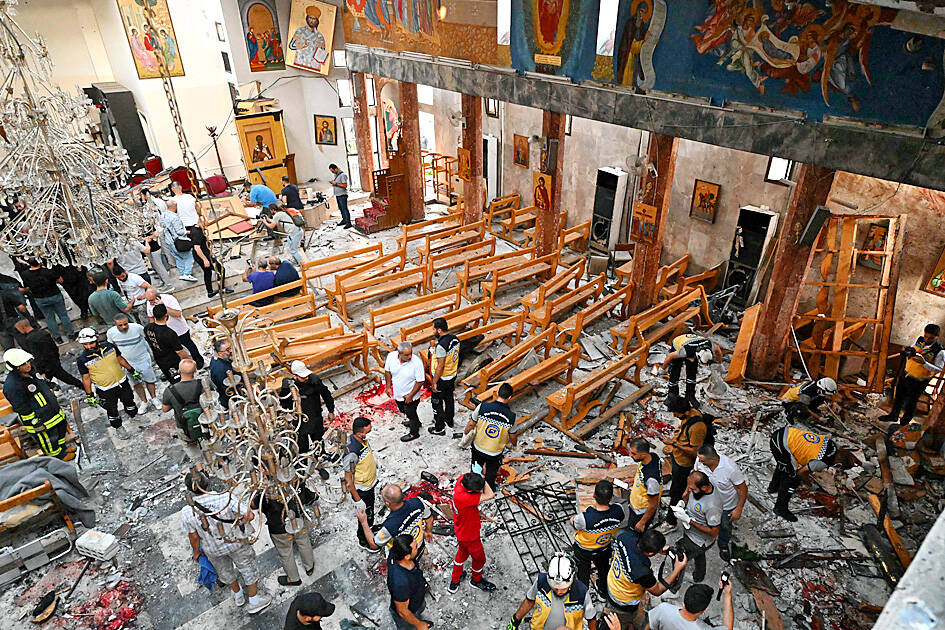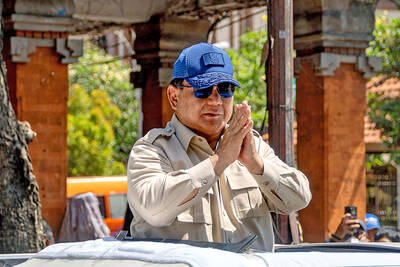A shooting and suicide bombing at a Damascus church during a packed service on Sunday killed at least 22 people, authorities said, blaming a member of the Islamic State group for the unprecedented attack.
The international community condemned the attack, the first of its kind in the Syrian capital since Islamist-led forces toppled former Syrian president Bashar al-Assad in December last year.
It was also the first inside a church in Syria since the nation’s civil war erupted in 2011, a monitor said.

Photo: AFP
Security remains one of the greatest challenges for Syria’s new authorities, with the international community repeatedly urging them to protect minorities.
Correspondents saw first responders transporting people from the Orthodox church as security forces cordoned off the area.
The church itself was strewn with wood from fittings and pews, with fallen icons and pools of blood on the floor.
“A suicide attacker affiliated with the Daesh [Islamic State] terrorist group entered the Saint Elias church in the Dwelaa area ... opened fire then blew himself up with an explosive belt,” a Syrian Ministry of Interior statement said.
State news agency SANA, citing the Syrian Ministry of Health, reported a death toll of 22, with 63 injured.
Lawrence Maamari, who was inside the church when the attack happened, said that a man had entered and begun shooting.
People “tried to stop him before he blew himself up,” he added.
Ziad Helou, 40, who was at a shop nearby, said he heard gunfire then an explosion, and saw glass flying.
“We saw fire in the church and the remains of wooden benches thrown all the way to the entrance,” he said.
The blast sparked panic and fear in the church, which had been full of worshipers, including children and the elderly, eyewitnesses said. Families were still searching desperately for missing loved ones.
The Syrian Observatory for Human Rights said it was the first suicide attack inside a church in Syria since war erupted in 2011. Other churches had been damaged or seen attacks in their vicinity during the conflict, but none had been so directly targeted.
The Orthodox patriarchate in Damascus called on “the authorities to bear full responsibility for what has happened and is happening concerning the violation of the sanctity of churches, and to ensure the protection of all citizens.”
Syria’s Christian community has shrunk from about 1 million before the war to fewer than 300,000 due to waves of displacement and emigration.
UN Special Envoy for Syria Geir Pedersen expressed “outrage at this heinous crime,” calling for a full investigation.
US Special Envoy for Syria Tom Barrack said Washington supported Syria “as it fights against those who are seeking to create instability and fear in their country and the broader region.”
Turkey, which is close to the new authorities, expressed confidence that Syrians would stay united in “their fight against terrorist organizations that seek to sow chaos in the country.”
The French Ministry for Europe and Foreign Affairs restated its commitment to “a transition in Syria that allows Syrians, whatever their religion, to live in peace and security in a free, united, pluralistic, prosperous, stable and sovereign” nation.
The Syrian Ministry of Foreign Affairs and Expatriates described the attack as “a desperate attempt to undermine national coexistence and to destabilize the country.”
Al-Assad had portrayed himself as a protector of minorities, who during Syria’s nearly 14-year civil war were targeted by numerous attacks. Since the new authorities took power, the international community has urged the government to protect minorities and ensure their participation in Syria’s transition, particularly after sectarian violence in recent months.
Syrian Minister of Interior Anas Khattab said that specialized teams had begun investigating.
“These terrorist acts will not stop the efforts of the Syrian state in achieving civil peace,” Khattab said in a statement.
Khattab in an interview earlier this month said that Islamic State had shifted “to studied attacks on strategic targets,” and had attempted “to carry out attacks against the Christian and Shiite community” that the authorities had thwarted.

DEADLOCK: Putin has vowed to continue fighting unless Ukraine cedes more land, while talks have been paused with no immediate results expected, the Kremlin said Russia on Friday said that peace talks with Kyiv were on “pause” as Ukrainian President Volodymyr Zelenskiy warned that Russian President Vladimir Putin still wanted to capture the whole of Ukraine. Meanwhile, US President Donald Trump said that he was running out of patience with Putin, and the NATO alliance said it would bolster its eastern front after Russian drones were shot down in Polish airspace this week. The latest blow to faltering diplomacy came as Russia’s army staged major military drills with its key ally Belarus. Despite Trump forcing the warring sides to hold direct talks and hosting Putin in Alaska, there

North Korea has executed people for watching or distributing foreign television shows, including popular South Korean dramas, as part of an intensifying crackdown on personal freedoms, a UN human rights report said on Friday. Surveillance has grown more pervasive since 2014 with the help of new technologies, while punishments have become harsher — including the introduction of the death penalty for offences such as sharing foreign TV dramas, the report said. The curbs make North Korea the most restrictive country in the world, said the 14-page UN report, which was based on interviews with more than 300 witnesses and victims who had

COMFORT WOMEN CLASH: Japan has strongly rejected South Korean court rulings ordering the government to provide reparations to Korean victims of sexual slavery The Japanese government yesterday defended its stance on wartime sexual slavery and described South Korean court rulings ordering Japanese compensation as violations of international law, after UN investigators criticized Tokyo for failing to ensure truth-finding and reparations for the victims. In its own response to UN human rights rapporteurs, South Korea called on Japan to “squarely face up to our painful history” and cited how Tokyo’s refusal to comply with court orders have denied the victims payment. The statements underscored how the two Asian US allies still hold key differences on the issue, even as they pause their on-and-off disputes over historical

CONSOLIDATION: The Indonesian president has used the moment to replace figures from former president Jokowi’s tenure with loyal allies In removing Indonesia’s finance minister and U-turning on protester demands, the leader of Southeast Asia’s biggest economy is scrambling to restore public trust while seizing a chance to install loyalists after deadly riots last month, experts say. Demonstrations that were sparked by low wages, unemployment and anger over lawmakers’ lavish perks grew after footage spread of a paramilitary police vehicle running over a delivery motorcycle driver. The ensuing riots, which rights groups say left at least 10 dead and hundreds detained, were the biggest of Indonesian President Prabowo Subianto’s term, and the ex-general is now calling on the public to restore their